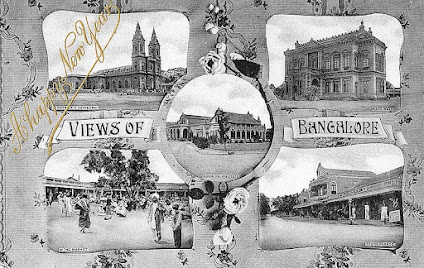
Creative Commons Attribution 4.0
Harini Nagendra is a professor of ecology at Azim Premji University. The Bangalore Detectives Club, her debut crime novel, was on the New York Times Notable Books of 2022 list, and nominated for a Lefty and Agatha award. Harini lives in Bangalore with her family, in a home filled with maps. She loves trees, mysteries, and traditional recipes. Learn more about Harini and her books at her website where you can also find links to her other social media.
Weaving India’s Colonial History into Crime Fiction
My day job as a professor of climate change in an Indian university involves the use of history, to understand how the ecology of Indian cities has changed over time. Surrounded by maps, archival documents, old letters, photographs, and other glimpses of the past – I often feel like a kid in a candy store. There is so much information, some of it hilarious, terrifying, or just plain weird – which I can’t use, because it doesn’t really fit into my research. Rarely, if ever, are the archives boring. When my colleagues stumbled upon the unbelievable adventures of William Edward Ashton James, assistant superintendent in the Mysore Revenue Survey in the late 19th century, I knew we had to write an article about him. James was stoned by local villagers, cheated by cartmen who gave him ‘unserviceable bullocks’ – and then, having completed his survey under very difficult circumstances, harassed by auditors who wanted to know why he spent so much money.
We came across many other stories, and I itched to write about them all. But I couldn’t - many had nothing to do with ecology. How could I tell people about the inspiring story of Coffeepudi Sakamma, a young widow with an infant son, who took over her husband’s coffee plantations and built a coffee empire, serving the Maharaja of Mysore in the early 20th century? Or about Kalyanamma, a child widow from Bangalore who became one of India’s pioneering women journalists, founding a school for women in 1913?
Writing a historical crime series, set in the 1920s, satisfied my desire to share these incredible stories of inspiring people with the wider world. Through The Bangalore Detectives Club, my first novel – set in colonial Bangalore in 1921 – I was able to explore some of the ways in which Indian women sought to navigate the Golden Age, which was a time of great possibility for them, but also a time in which they faced significant restrictions on their freedom. In Murder Under a Red Moon, book 2 in the series, I paid tribute to Coffeepudi Sakamma, Kalyanamma and other women of those times, who did things that I would not have believed to possible for women living in back then – had I not read about them.
My grandmother was born over a century ago. She could read and write in at least three languages – Sanskrit, Tamil and English – and could speak many more, including Kannada, Marathi and Telugu. Despite being the daughter of a lawyer and the wife of a schoolteacher, she didn’t get to be this well educated without a struggle. Her elder sister staged a revolt, going to the local school (then attended only by boys) and taking my grandmother with her - when they were between six and eight years old. She fought against societal expectations – and blazed the way for others to follow. Writing about lives of other women of the 1920s, in colonial India, inspires me – it brings hope that society can change, for the better. I’m so glad that I now have a place to embellish and embed these wonderful stories, in historical mysteries.
Murder Under a Red Moon
A Bangalore Detective Mystery, Book 2
When new bride Kaveri Murthy reluctantly agrees to investigate a minor crime to please her domineering mother-in-law—during the blood moon eclipse, no less—she doesn’t expect, once again, to stumble upon a murder.
With anti-British sentiment on the rise, a charismatic religious leader growing in influence, and the fight for women’s suffrage gaining steam, Bangalore is turning out to be a far more dangerous and treacherous place than Kaveri ever imagined—and everyone’s motives are suspect.
Together with the Bangalore Detectives Club—a mixed bag of street urchins, nosy neighbours, an ex-prostitute, and a policeman’s wife—Kaveri once again sleuths in her sari and hunts for clues in her beloved 1920s Ford.
But when her life is suddenly put in danger, Kaveri realizes that she might be getting uncomfortably close to the truth. So she must now draw on her wits and find the killer . . . before they find her.
Buy Links


4 comments:
👌
Prabhakara S
Thank you Prabhakara
Such a nice piece Harini! You make history so relatable interesting and fun!
Post a Comment